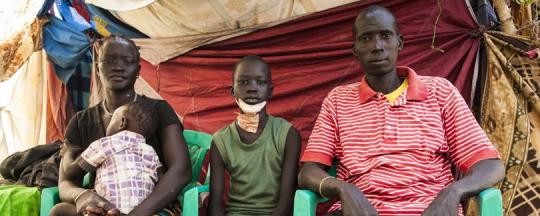The UN Office for the Coordination of Humanitarian Affairs (OCHA) reports that overcrowding at bases in the capital Juba is causing sanitation and health problems leading to higher mortality rates.
More than 38,000 people shelter at two UN bases in Juba, almost all of them ethnic Nuers, owing to fears for their safety should they return to the streets and homes.
In a situation report covering the period through Monday, OCHA noted, “The health situation in the UN Tomping base deteriorated, with increases in mortality rates, especially among children under five.”
“The deterioration is due to overcrowding in the site – which currently hosts over 27,500 people – combined with poor sanitary conditions caused by a lack of space to construct additional latrines and bathing areas, as well as measles affecting children,” added the report.
According to the aid agency, more land has been allocated within the UN bases for latrines. Similar problems were reported at UN bases in other towns, with aid workers encountering sanitation challenging owing to “limited space within UN bases that prevent timely decommissioning and building new latrines.”
Overcrowding at the UN bases is caused by the fear of displaced people leave their homes as well as government delays in allocating more space for the displaced at sites outside the bases. On Saturday a group of 10 SPLA mounted on a Land Cruiser drove to the main gate of the UN House base and threatened to arrest any male IDP who left the base, according to a UN source. This followed a fight in the neighborhood of the base previously.
Total displacement estimates have risen to 873,800, including 743,400 people displaced inside South Sudan and another 130,400 people who fled to neighbouring countries.
In Malakal, the disaster response scaled up with relief agencies starting food distributions in neighboring Wau Shiluk and resumption of surgical activities at the Malakal Teaching Hospital.
Malnutrition, meanwhile, is reported in several other areas, including Yirol West where 192 people were assessed for malnutrition, including 33 pregnant and lactating women, and in Malakal where a rate of 10.39% for moderate acute malnutrition and 7.87% for severe acute malnutrition was found in a population of nearly 600 children screened for malnutrition.
Photo: A family at the UNMISS compound in Tong Ping. The boy seated at center was shot twice by the government forces while he was collecting water inside the IDP camp, 17 January 2014 (Adriane Ohanesian)
Related:
Key humanitarian updates, 31 Jan.
Key humanitarian updates, 28 Jan.




